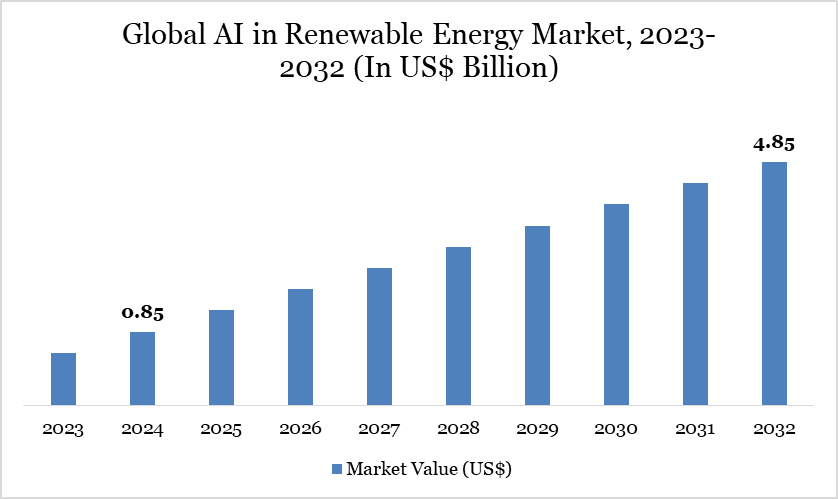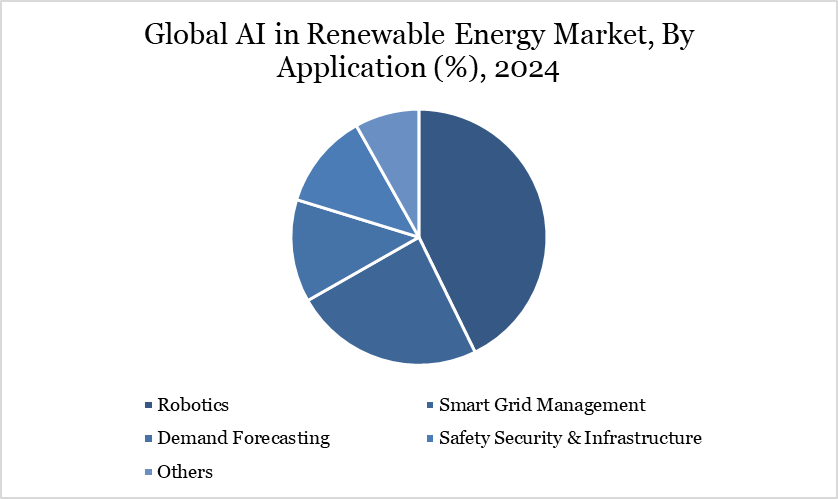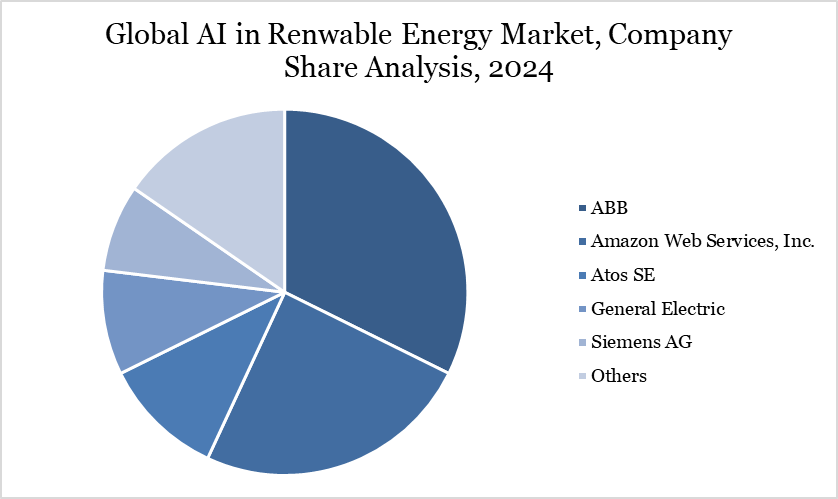AI in Renewable Energy Market Overview
Global AI in Renewable Energy Market reached US$ 0.85 billion in 2024 and is expected to reach US$ 4.85 billion by 2032, growing with a CAGR of 24.32% during the forecast period 2025-2032.
The AI in Renewable Energy market is in its early stages of development, owing to growing demand for sustainable energy sources, sophisticated artificial intelligence technology and increased government initiatives aimed at reducing carbon footprints. AI in renewable energy includes applications like grid management, energy forecasting and preventative maintenance, as well as the integration of multiple renewable energy sources including solar, wind and hydropower.
The growing awareness of climate change and the urgent need for sustainable energy sources are key drivers for AI in the renewable energy market. In accordance to the International Renewable Energy Agency (IRENA), renewable energy could satisfy up to 86% of the world's electricity consumption by 2050 if present targets are met, emphasizing the possible need for AI to optimize renewable energy infrastructure.
AI in Renewable Energy Market Trend
Data analytics for predictive maintenance and energy forecasting is a significant trend that will drive worldwide market growth. AI-powered predictive maintenance is crucial for reducing downtime and extending the life of renewable energy systems. As noted by the European Commission, AI analytics will lower maintenance windfarm costs across Europe by approximately 15-20%, owing to the ability of predictive models to detect potential breakdowns and schedule operations efficiently.
AI is boosting the efficiency of energy dispatch processes through the use of AI-enhanced energy forecasting, in which power generation from variable renewable sources is projected with more precision, contributing to real-time demand management. Furthermore, government programs such as 'green' encourage the employment of AI in the renewable business. For example, the European Union's Green Deal, which aims to reduce carbon emissions to net zero by 2030, promotes the development and implementation of digital technologies within the energy ecosystem.

For more details on this report – Request for Sample
Market Scope
| Metrics | Details |
| By Deployment | On-Premises, Cloud-based |
| By Component | Solutions, Services |
| By Application | Robotics, Smart Grid Management, Demand Forecasting, Safety Security & Infrastructure, Others |
| By End-User | Energy Transmission, Energy Generation, Energy Distribution, Utilities |
| By Region | North America, South America, Europe, Asia-Pacific, Middle East and Africa |
| Report Insights Covered | Competitive Landscape Analysis, Company Profile Analysis, Market Size, Share, Growth |
AI in Renewable Energy Market Dynamics
Private Sector Investments and Technological Partnerships
The private sector is significantly investing in AI-powered renewable energy initiatives. For example, Google has collaborated with the energy sector to use AI technologies to increase the efficiency of solar panels and electricity distribution in grids. The World Economic Forum predicts that energy firms will expand investing on artificial intelligence technologies in the next years, with significant technology players and energy companies collaborating to improve renewable energy artificial intelligence solutions.
Similarly, the US Energy Department has made investments in artificial intelligence and renewable energy technology, recognizing AI's potential in energy management. In accordance with the IEA, grid-based digital technology investment has risen by over 50% since 2015 and is expected to account for 19% of total grid investment by 2023, in preparation for AI integration in renewable energy.
Regulatory and Workforce Challenges
The renewable energy sector faces significant regulatory and personnel obstacles that impede the use of artificial intelligence (AI) solutions. Regulatory compliance with rules aimed to protect information, especially personal data. For example, the EU GDPR makes it impossible to collect and analyze energy use data for AI systems. The legislation requires informed consent to use personal data for any purpose, leaving AI engineers with a tangle of laws to work for data.
Similarly, the renewable energy industry is experiencing a talent scarcity for artificial intelligence and data analytics. According to the International Labor Organization (ILO), the sector suffers a manpower shortage in the creation and operation of artificial intelligence systems. This skills gap limits expansion or efficiency improvements, making it more difficult to integrate AI-based systems.
AI in Renewable Energy Market Segment Analysis
The global AI in renewable energy market is segmented based on offering, component, application, end-user and region.

High Demand and Emerging Technology Smart Grid Management
The integration of artificial intelligence (AI) technology into smart grid systems is transforming energy management by enabling data-driven policies and actions. According to a research conducted by the Electric Power Research Institute (EPRI), AI-powered smart grids can reduce energy distribution losses by up to 30% while allowing for real-time energy reallocation. Furthermore, the World Economic Forum states that the application of AI boosts energy reliability in such systems by 25%, supporting the goal of increased grid performance through the use of AI.
AI techniques like machine learning and predictive analytics generate vast amounts of data from a variety of inputs on the grid. This allows for real-time monitoring and efficient control of energy resources within the system. Data from smart meters and sensors enables AI systems to analyze inefficiencies, estimate demand and address the constraints of renewable energy. This capability not only improves operational efficiency but also contributes to sustainability by reducing waste creation and improving energy supply systems.
AI in Renewable Energy Market Geographical Share
Significant Investments in Renewable Energy in North America
North America leads the global AI in renewable energy industry due to significant expenditures in renewable energy infrastructure, favorable government legislation and the implementation of superior AI techniques. The United States Department of Energy (DOE) has committed hundreds of millions of dollars in federal research initiatives and tax incentives for renewable energy, mostly to encourage the development of energy systems based on artificial intelligence. Amazon, REC and BlackRock have pledged US$ 500 million to support renewable energy AI initiatives.
In Canada, the renewable energy sector is also seeing an increase in the use of artificial intelligence applications as a result of supportive government policies such as the Pan-Canadian Framework on Clean Growth and Climate Change, which actively promotes the use of AI to improve energy efficiency and reduce emissions. Similarly, the Emerging Renewable Power Program (ERPP) in Canada aims to offer provinces and territories with another US$ 200 million to help diversify the range of economically feasible renewable energy resources available to them in order to meet the GHG emissions reduction targets for the electricity sector.
Sustainability Analysis
The use of AI is essential in reaching sustainability goals in the renewable energy industry. Optimizing energy use, reducing waste generation and enhancing grid efficiency are all part of the system creation criteria that aim to reduce energy use in a sustainable manner. AI technologies have significantly improved the management of renewable resources, allowing for full usage with minimal environmental impact.
According to the International Sustainability Council, renewables might help reduce carbon emissions by 20% over the next ten years, as part of efforts to achieve net zero. This is in addition to the previously strengthened resilience of renewable infrastructure territories, where energy systems controlled by AI are so predictive that they withstand shocks and bounce back quickly from unexpected occurrences.
AI in Renewable Energy Market Major Players
The major global players in the market include ABB, Alpiq, Amazon Web Services, Inc., Atos SE, FlexGen Power Systems, Inc., General Electric, Informatec Ltd., N-iX LTD, Schneider Electric and Siemens AG.

Key Developments
In May 2024, Schneider Electric took a huge breakthrough in home energy management by introducing an AI-powered function to its Wiser Home app. This new functionality focuses on two of the greatest residential energy consumers: water heaters and electric vehicle (EV) chargers, allowing homeowners to optimize their energy consumption.
In June 2024, N-iX has released Chat-iX, an artificial intelligence-powered conversational assistant for business. This safe and user-friendly platform enables employees and professionals to collaborate with various AI systems, hence improving corporate processes and workflows. N-iX has also modified Chat-iX for numerous sectors, including energy, retail, manufacturing, healthcare and finance, providing customized services to the unique requirements of these areas.
Why Choose DataM?
Data-Driven Insights: Dive into detailed analyses with granular insights such as pricing, market shares and value chain evaluations, enriched by interviews with industry leaders and disruptors.
Post-Purchase Support and Expert Analyst Consultations: As a valued client, gain direct access to our expert analysts for personalized advice and strategic guidance, tailored to your specific needs and challenges.
White Papers and Case Studies: Benefit quarterly from our in-depth studies related to your purchased titles, tailored to refine your operational and marketing strategies for maximum impact.
Annual Updates on Purchased Reports: As an existing customer, enjoy the privilege of annual updates to your reports, ensuring you stay abreast of the latest market insights and technological advancements. Terms and conditions apply.
Specialized Focus on Emerging Markets: DataM differentiates itself by delivering in-depth, specialized insights specifically for emerging markets, rather than offering generalized geographic overviews. This approach equips our clients with a nuanced understanding and actionable intelligence that are essential for navigating and succeeding in high-growth regions.
Value of DataM Reports: Our reports offer specialized insights tailored to the latest trends and specific business inquiries. This personalized approach provides a deeper, strategic perspective, ensuring you receive the precise information necessary to make informed decisions. These insights complement and go beyond what is typically available in generic databases.
Target Audience 2024
Manufacturers/ Buyers
Industry Investors/Investment Bankers
Research Professionals
Emerging Companies